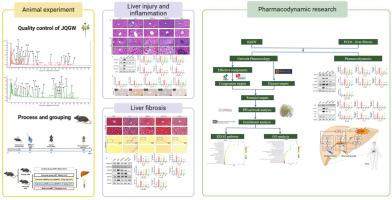Jiawei Qi Gong Wan improves liver fibrosis and inflammation in PCOS mice via the Akt2-FoxO1 and YAP/TAZ signaling pathways
IF 6.7
1区 医学
Q1 CHEMISTRY, MEDICINAL
引用次数: 0
Abstract
Background
Metabolic disorders in polycystic ovary syndrome (PCOS) patients have attracted increasing attention, and nonalcoholic fatty liver disease (NAFLD) in particular has been the focus of much research due to its high incidence and potential harm in patients with PCOS. However, little is known about whether PCOS is associated with more severe NAFLD histopathology. Although Jiawei Qi Gong Wan (JQGW) is widely used clinically, its specific effects and mechanisms on the liver remain unclear.
Purpose
The aim of this study was to explore the mechanism of JQGW in improving metabolic abnormalities in the liver in PCOS mice in order to support the development of therapies to prevent PCOS complications.
Methods
A mouse model of PCOS was established by subcutaneously implanting letrozole tubes. The effect of JQGW on liver metabolism in mice was observed by measuring biochemical indicators in serum. Liver morphological changes were observed using hematoxylin and eosin staining along with Sirius red staining, while Western blotting and qRT-PCR were used to quantify the expression of genes and proteins related to liver fibrosis and inflammation processes. Network pharmacology was used to analyze the key factors that JQGW may target in improving liver fibrosis in PCOS mice, and the results were verified by Western blotting of liver tissue from PCOS mice.
Results
PCOS mice had obvious liver metabolic dysfunction, inflammation, and fibrosis, all of which could be reversed by JQGW. Network pharmacology functional enrichment revealed that the overlapping targeted genes were enriched mainly in insulin resistance-related pathways and androgen-related pathways. We verified related proteins and found that JQGW improved liver fibrosis and inflammation in PCOS mice mainly by regulating the Akt2-FoxO1 and YAP/TAZ signaling pathways.
Conclusion
JQGW can improve liver metabolic function in a letrozole-induced PCOS mouse model by inhibiting liver fibrosis and inflammation, and it acts mechanistically by regulating the Akt2-FoxO1 and YAP/TAZ signaling pathways. Our findings thus provide a valuable reference for the advancement of therapeutic strategies aimed at addressing PCOS patients with abnormal liver metabolism.

求助全文
约1分钟内获得全文
求助全文
来源期刊

Phytomedicine
医学-药学
CiteScore
10.30
自引率
5.10%
发文量
670
审稿时长
91 days
期刊介绍:
Phytomedicine is a therapy-oriented journal that publishes innovative studies on the efficacy, safety, quality, and mechanisms of action of specified plant extracts, phytopharmaceuticals, and their isolated constituents. This includes clinical, pharmacological, pharmacokinetic, and toxicological studies of herbal medicinal products, preparations, and purified compounds with defined and consistent quality, ensuring reproducible pharmacological activity. Founded in 1994, Phytomedicine aims to focus and stimulate research in this field and establish internationally accepted scientific standards for pharmacological studies, proof of clinical efficacy, and safety of phytomedicines.
 求助内容:
求助内容: 应助结果提醒方式:
应助结果提醒方式:


